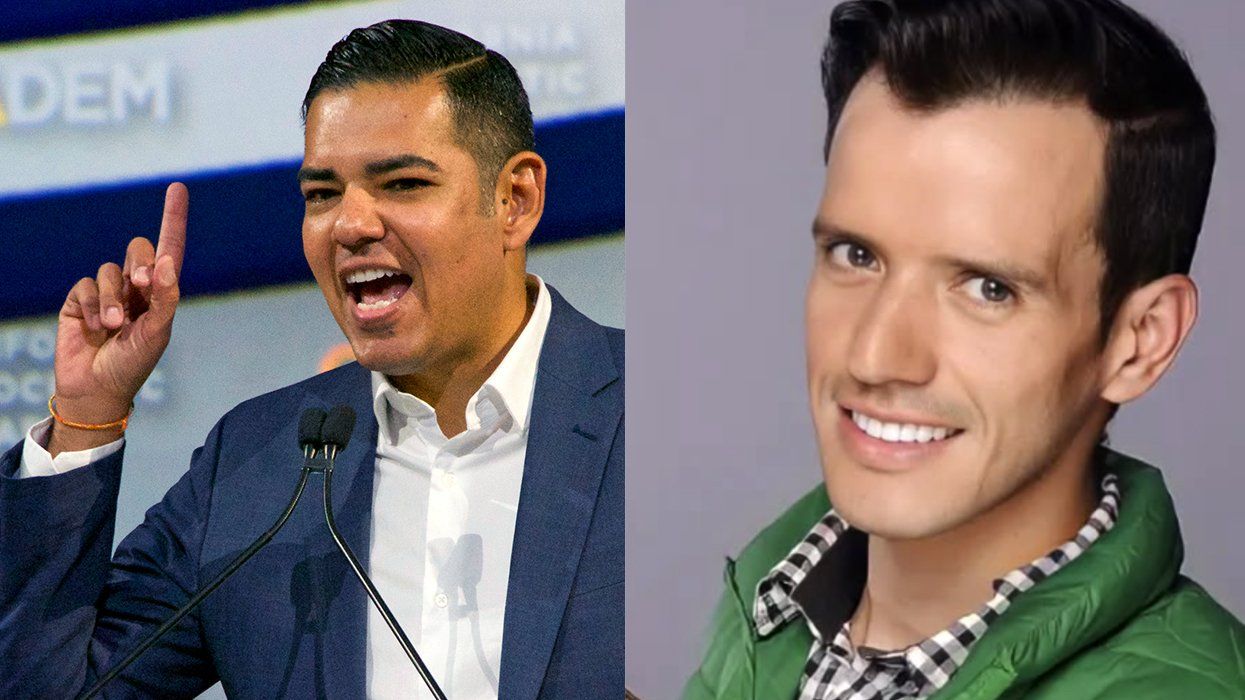U.S. Rep. Robert Garcia is demanding answers from both Immigration and Customs Enforcement and private prison company CoreCivic over the secretive deportation of a gay Venezuelan asylum-seeker to one of the world’s most notorious prisons, and he and three other lawmakers have traveled to El Salvador to check on him.
Keep up with the latest in LGBTQ+ news and politics. Sign up for The Advocate's email newsletter.
In two letters dated April 17, Garcia, a gay California Democrat, raised what he called “grave concerns” about the deportation of Andry José Hernández Romero to El Salvador under the Alien Enemies Act. Hernandez Romero was reportedly deported and sent to CECOT, a mega-prison described as more like a concentration camp, based on a gang determination made by a private contractor employed by CoreCivic, despite what Garcia says is “a lack of credible evidence and in violation of a federal court order.”
Hernández Romero entered the U.S. legally through the CBP One app and passed an initial asylum screening, his attorney told The Advocate.
According to Garcia, he had no criminal history and was deported based solely on tattoos of crowns labeled “Mom” and “Dad,” linked to Three Kings Day traditions in his hometown of Capacho. Experts and press investigations have noted that the Tren de Aragua gang does not use tattoos as identifiers, Garcia said.
Related: Gay Venezuelan asylum-seeker ‘disappeared’ to Salvadoran mega-prison under Trump order, Maddow reveals
Lindsay Toczylowski, Hernandez Romero’s attorney and executive director of Immigrant Defenders Law Center, told The Advocate that the entire premise of his deportation is flawed.
“The only thing that they have ever filed in any occasion, and it was in his immigration court proceedings at the immigration court level, were pictures of his tattoos that were accompanied by an interview where he denied any gang membership,” Toczylowski said in an interview. “And they said ‘crowns are known to be a symbol of Tren de Aragua, and therefore, we believe he’s a member of this gang.’”
Garcia’s letter to ICE Acting Director Tae Johnson demands a full accounting of the deportation decision, including whether ICE independently reviewed the gang determination and what legal authority permits private contractors to influence deportation outcomes. “We urge ICE to provide transparency and accountability in this matter to uphold the integrity of our immigration system and protect the rights of asylum seekers,” Garcia wrote.
Related: Attorney deeply worried about gay asylum-seeker detained & disappeared to Salvadoran ‘hellhole’ CECOT
In a separate letter to CoreCivic CEO Damon Hininger, Garcia called out the role of Charles Cross Jr., the contractor whose report allegedly triggered the deportation. Garcia noted Cross’s prior misconduct as a police officer in Wisconsin, including a conviction for criminal damage to property and a DUI crash that led to his termination from the Milwaukee Police Department. “Despite this, he was employed by CoreCivic and authorized to make determinations that directly impact individuals’ immigration status,” Garcia wrote.
Toczylowski said that based on all available evidence, Hernandez Romero is not a threat to anyone. “He never even left the detention facilities,” she said. “he has never been in any kind of custody of police or the government until he ended up in ICE detention.”
The only images Toczylowski has seen of her client since his disappearance from ICE custody on March 13 came from Time magazine’s reporting on El Salvador’s CECOT prison. “When we confirmed that it was him in those Time magazine photos, I was absolutely gutted,” she said. “Because it meant that our worst fears for him were true.”
Garcia has requested responses from ICE and CoreCivic by May 1.
On Monday, Garcia and three other Democratic U.S. lawmakers traveled to El Salvador to investigate the situation for those detained, including to conduct a welfare check on Hernández Romero. Garcia and Yassamin Ansari of Arizona, Maxwell Frost of Florida, and Maxine Dexter of Oregon had sent a letter to Secretary of State Marco Rubio requesting that they or Hernández Romero's lawyers be able to see him.
"As a gay man, Mr. Hernández Romero is at particular risk of persecution if deported or imprisoned in El Salvador, a country where LGBTQIA+ people can face 'torture, inhuman or degrading treatment, excessive use of force, illegal and arbitrary arrests and other forms of abuse, much of it committed by public security agents,'" the letter states.
















Charlie Kirk DID say stoning gay people was the 'perfect law' — and these other heinous quotes
These are some of his worst comments about LGBTQ+ people made by Charlie Kirk.